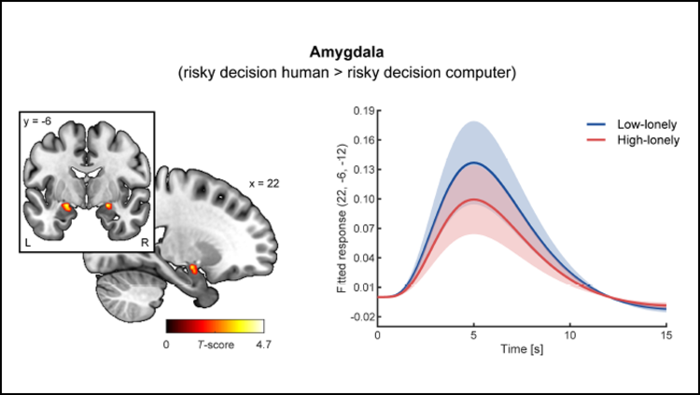Despite similar symptoms, loneliness and social anxiety are driven by different brain states, according to new research published in JNeurosci.

Credit: Lieberz et al., JNeurosci 2021
Despite similar symptoms, loneliness and social anxiety are driven by different brain states, according to new research published in JNeurosci.
Loneliness can have detrimental consequences on physical and mental health, yet there are currently few behavioral interventions for loneliness like there are for other conditions. Lieberz et al. explored the basis for these two conditions by comparing how people with social anxiety and high and low loneliness behaved in a social gambling task. Participants played a computer game where they could make a safe bet and win a smaller amount of money or make a riskier bet for a larger sum. If they took the riskier bet, they watched a video of a virtual human showing approval or disapproval.
People with social anxiety took the safe bet more often to avoid social feedback from the videos. But people with high loneliness did not display this social avoidance. By measuring the participants’ brain activity during the task with fMRI, the researchers found people with social anxiety displayed increased amygdala activation during the decision phase — a sign of heightened anxiety — and reduced nucleus accumbens activation during the feedback phase — a sign of reduced social reward. Neither activity pattern appeared in people with high loneliness, indicating loneliness is a unique condition requiring its own interventions.
###
Paper title: Behavioral and Neural Dissociation of Social Anxiety and Loneliness
Please contact [email protected] for the full-text PDF and to join SfN’s journals media list.
About JNeurosci
JNeurosci, the Society for Neuroscience’s first journal, was launched in 1981 as a means to communicate the findings of the highest quality neuroscience research to the growing field. Today, the journal remains committed to publishing cutting-edge neuroscience that will have an immediate and lasting scientific impact, while responding to authors’ changing publishing needs, representing breadth of the field and diversity in authorship.
About The Society for Neuroscience
The Society for Neuroscience is the world’s largest organization of scientists and physicians devoted to understanding the brain and nervous system. The nonprofit organization, founded in 1969, now has nearly 37,000 members in more than 90 countries and over 130 chapters worldwide.
Journal
JNeurosci
DOI
10.1523/JNEUROSCI.2029-21.2022
Method of Research
Observational study
Subject of Research
People
Article Title
Behavioral and neural dissociation of social anxiety and loneliness
Article Publication Date
14-Feb-2022




